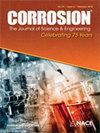机械扭转对SBF中MgCa1腐蚀行为的影响
IF 1.3
4区 材料科学
Q4 MATERIALS SCIENCE, MULTIDISCIPLINARY
引用次数: 0
摘要
本文研究了机械扭转对MgCa1合金在模拟体液(SBF)中腐蚀的影响。通过微观结构观察,包括配备能谱检测器(EDS)的扫描电子显微镜(SEM)和电化学研究,主要是阻抗谱测量(EIS)和极化曲线(PC)来研究腐蚀行为。实验进行了不同的持续时间(4-8小时),施加和不施加扭转(在旋转运动形式的弹性变形范围内),以分配样品的腐蚀行为之间的差异。结果表明,机械扭转(旋转)促进了样品中钙从晶界的浸出,从而降低了合金的整体腐蚀速率。另一方面,钙化合物浸出的晶界通过促进裂纹的形成和扩展而影响试样的微观结构。因此,旋转后的样品以较低的速率腐蚀,但更容易发生灾难性的破坏。因此,MgCa1合金可能是一种有前景的医用植入物生物降解材料,但其在SBF中施加扭转的耐久性远远不能令人满意。本文章由计算机程序翻译,如有差异,请以英文原文为准。
Influence of mechanical torsion on MgCa1 corrosion behavior in SBF
ABSTRACT In this paper, the influence of mechanical torsion on corrosion of MgCa1 alloy in simulated body fluid (SBF) is presented. The corrosion behavior is examined by microstructural observations, including a scanning electron microscope (SEM) equipped with energy dispersive spectroscopy detector (EDS) and electrochemical studies, mainly impedance spectroscopy measurements (EIS) and polarization curves (PC). The experiments were performed for different time durations (4-8 h) with and without torsion applied (within elastic deformation range in the form of rotary movements) to assign the differences between the corrosion behavior of the samples. It is shown that mechanical torsion (rotations) promotes the leaching of calcium from the grain boundaries in the samples, what decreases the overall alloy corrosion rate. On the other hand, grain boundaries leached out of calcium compounds influence the sample microstructure by enabling for cracks formation and propagation. Therefore, rotated samples corroded at a lower rate but were more susceptible to catastrophic failure. It was then concluded that MgCa1 alloy may be promising biodegradable material for medical implants, however, its durability in SBF with torsion applied is far from being satisfactory.
求助全文
通过发布文献求助,成功后即可免费获取论文全文。
去求助
来源期刊

Corrosion
MATERIALS SCIENCE, MULTIDISCIPLINARY-METALLURGY & METALLURGICAL ENGINEERING
CiteScore
2.80
自引率
12.50%
发文量
97
审稿时长
3 months
期刊介绍:
CORROSION is the premier research journal featuring peer-reviewed technical articles from the world’s top researchers and provides a permanent record of progress in the science and technology of corrosion prevention and control. The scope of the journal includes the latest developments in areas of corrosion metallurgy, mechanisms, predictors, cracking (sulfide stress, stress corrosion, hydrogen-induced), passivation, and CO2 corrosion.
70+ years and over 7,100 peer-reviewed articles with advances in corrosion science and engineering have been published in CORROSION. The journal publishes seven article types – original articles, invited critical reviews, technical notes, corrosion communications fast-tracked for rapid publication, special research topic issues, research letters of yearly annual conference student poster sessions, and scientific investigations of field corrosion processes. CORROSION, the Journal of Science and Engineering, serves as an important communication platform for academics, researchers, technical libraries, and universities.
Articles considered for CORROSION should have significant permanent value and should accomplish at least one of the following objectives:
• Contribute awareness of corrosion phenomena,
• Advance understanding of fundamental process, and/or
• Further the knowledge of techniques and practices used to reduce corrosion.
 求助内容:
求助内容: 应助结果提醒方式:
应助结果提醒方式:


